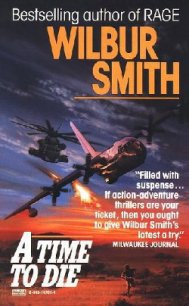Elephant Song - Smith Wilbur (читать книги онлайн бесплатно полностью без .TXT) 📗
She saw in him the true patriot, completely devoted to his little nation. He was, in addition, the only African Kelly had ever met who was above tribalism. He had spent his entire political life trying to appease and ameliorate the terrible curse that was, in both their views, the single most tragic fact of the African reality. He should have been an example to the rest of the continent, and to his peers in the high councils of the Organisation of African Unity.
When, almost single-handed, he had obtained independence from the colonial administration, the preponderance of his fellow Uhah tribesmen had swept him into the presidential office and overturned at a single stroke the centuries of brutal domination by the proud Hita aristocracy.
The greatest crisis of his presidency had come within the very first days of independence. The Uhali tribe had turned upon the Hita in a savage orgy of retribution. In five terrible days, over twenty thousand Hita had perished. The mob had torched their manyattas.
Those Hita who survived the flames were hacked to death with hoes and machetes. The tools with which the enslaved Uhali had tilled the fields and hewn the firewood for their masters were turned upon them.
The proud Hita women, tall and stately and beautiful, were stripped of their traditional ankle-length robes, and the elaborately plaited locks in which they gloried were hacked roughly from their heads. They were herded naked before the jeering Ubali mob, and petted with excrement.
Some of the women were lifted struggling and naked and impaled upon the poles of the manyattas outer stockade.
The younger women and girls had been yoked between two of their own oxen, secured with rawhide thongs by each ankle.
Then the mob had urged the oxen forward and the girls had been torn apart.
Kelly had not been there to witness these atrocities. She had been a schoolgirl in England at the time, but the legend had become history of how Victor Omeru had gone out to plead with the mob and physically to interpose himself between them and their Hita victims. With the sheer force of his personality he had brought the slaughter to an end, and virtually saved the Hita tribe from genocide and extinction.
Nevertheless, thousands of Hita perished and fifty thousand fled for sanctuary into the neighbouring countries of Uganda and Zaire.
It had taken a major exercise of statesmanship over decades of wise government for Victor Omeru to cool the terrible tribal animosities of his people, to persuade the exiled Hita to return to Ubomo, to restore their herds and their grazing lands to them, and to bring their young men in from the traditional pastoral ways to education and advancement in the modern Ubomo nation he was trying to build.
In recompense for those terrible first days of independence Victor had always thereafter erred on the side of leniency towards the Hita tribe.
To demonstrate his trust and faith in them he allowed them gradually to take control of Ubomo's little army and police force. Ephrem Taffari himself had travelled abroad to complete his education on a special scholarship provided by Victor Omeru out of his own meagre presidential salary.
Victor Omeru was paying for that generosity now. Once again the Uhali tribe groaned beneath the Hita tyranny. As so often happens in Africa, the cycle of oppression and brutality had run its full course, but even now as they sat on the wide verandah of the bungalow, immersed in discussion, Kelly could still detect the suffering and concern for his nation and all his people in Victor Omeru's dark eyes.
It seemed cruel to add to his misery but she could no longer keep it from him. Victor, there is something awful happening up there, in the rivers of the forest, in the sacred Bambuti heartland. Something so terrible that I hardly know how to describe it to you. He listened without interruption, but when she had finished he said quietly, Taffari is killing our people and our land. The vultures smell death in the air and they are gathering, but we will stop them. Kelly had never seen him so angry before. His face was hard and his eyes were dark and terrible.
They are powerfUL, Rich and powerful. There is no power to match that of honest men and a just cause, he replied, and his strength and determination were contagious. Kelly felt her despair slough away, leaving her feeling renewed and confident. Yes, she whispered. We will find a way to stop them. For the sake of this land we must find a way.
beautiful. The name was appropriate, Tug Harrison conceded, as the RollsRoyce Silver Spirit left the littoral plain and climbed up into the green mountains. The road swept around a shoulder of one of the peaks and for a moment Tug gazed out across the broad Formosa Straits and fancied he saw the loom of mainland China lurking like a dragon a, hundred and more miles out there in the blue distance. Then the road turned again and they were back into the forests of cypress and cedar.
They were four thousand feet above the humid tropical plain and the bustle of Taipei, one of the busiest and most affluent cities in Asia.
The air up here was sweet and cool; there was no need of the Rolls's superb air-conditioning system.
Tug felt relaxed and clear-headed. It was one of the joys of having your own jet aircraft, he smiled. The Gulfstream flew when he was ready, wherever he wanted to go. There was none of the aggravation of large airports and throngs of the great unwashed multitude. No miles of corridors to traverse nor luggage carousels at which to play the guessing game of will it come or won't it, no surly customs officials and porters and taxi-drivers.
Tug had taken it in easy stages from London. Abu Dhabi, Bahrain, Brunei, Hong Kong, he had spent a day or two in each of those centres in all of which he had major games in play.
The stop-over in Hong Kong had been particularly worthwhile. The richest and more prudent of the Hong Kong businessmen were intent on moving out their assets and relocating ahead of the termination of the treaty and the reversion of the territory to mainland China. In the permanent suite which he kept at the Peninsula Hotel, Tug had signed two agreements which should net him ten million pounds over the next few years. When his chief pilot touched down at Taipei airport, ground control directed Tug's Gulfstream to taxi to a discreet parking billet behind the Cathay Pacific hangars and the Rolls-Royce was waiting on the tarmac, with the younest son of the Ning;
family to meet him.
Customs and Immigration, in the shape of two uniformed officials, were ushered aboard, bobbing and smiling, by his host.
They stamped Tug's red diplomatic passport and placed the in bond'seals on hisprivatebarand departed, all within five minutes.
In the meantime Tug's matched set of Louis Vuitton luggage was being transferred to the boot of the Rolls by a team of white-jacketed and gloved servants. Within fifteen minutes of touchdown, the Rolls whisked him out of the airport gates.
Tug felt so good that he was inclined to philosophise. He compared other journeys he had made when he was young and poor and struggling.
On foot and bicycle and native bus he had crossed and recrossed the African continent. He remembered his first motor vehicle, a Ford V-8
truck with front mudguards like elephant ears, smooth tyres that never ran fifty miles without puncturing, and an engine held together with balingwire and hope. He had been immensely proud of it at the time.
Even his first air flight on one of the old Sunderland flying boats that once plied the African continent, landing to refuel on the Zambezi, the great lakes, and finally the Nile itself, had taken ten days to reach London.




